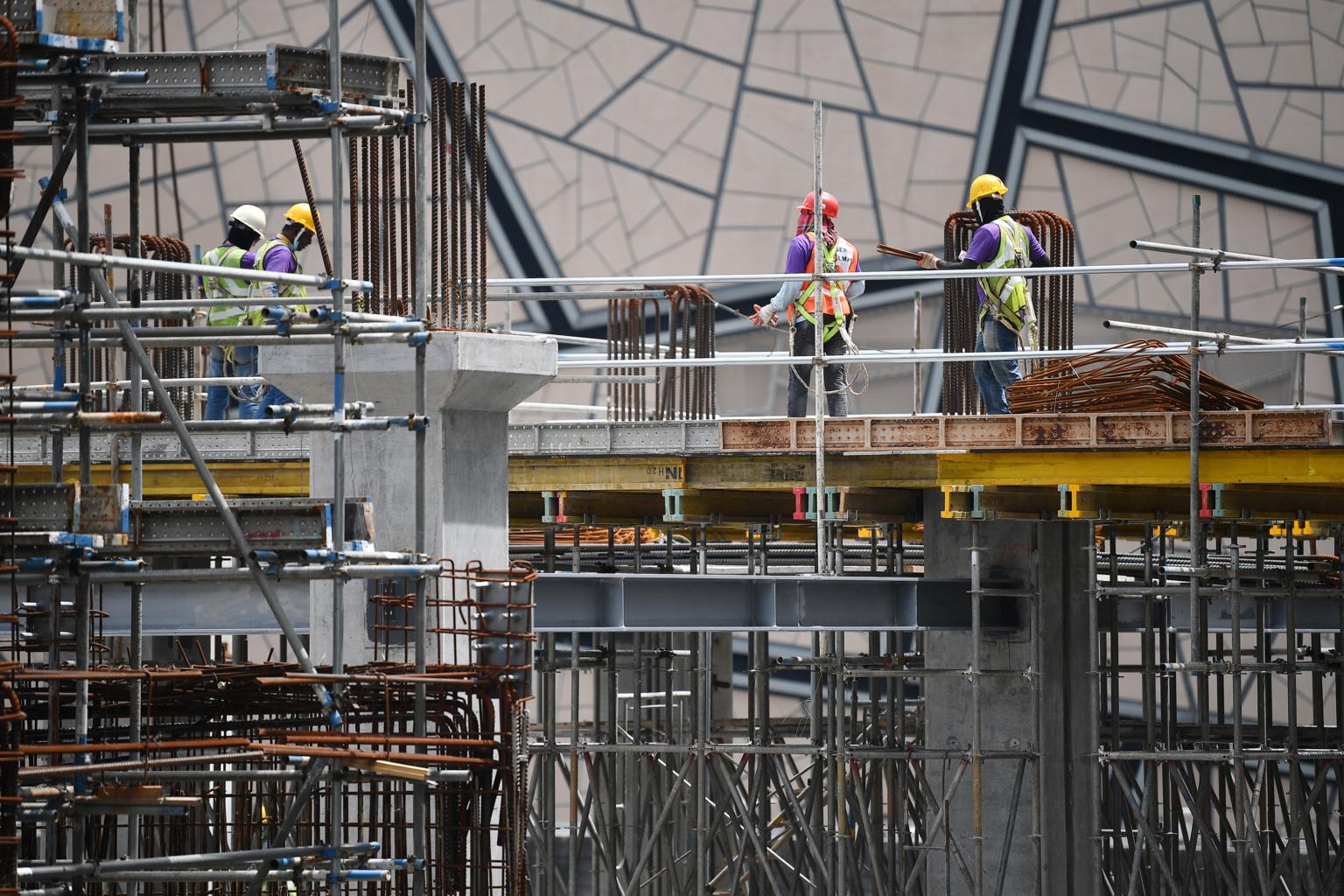Changes to public sector construction tenders from Nov 1 to factor in pandemic risks
Sign up now: Get ST's newsletters delivered to your inbox

These changes were outlined in a circular from the Building and Construction Authority dated Sept 23.
ST PHOTO: LIM YAOHUI
Follow topic:
SINGAPORE - Changes will be made to public sector construction tenders called from Nov 1 to factor in risks arising from pandemics such as Covid-19.
The key amendments are to allow contractors to apply for time extension due to a pandemic and to include provisional sums for anticipated pandemic-related expenses for which the extent or cost is unknown at the time of tender.
These changes were outlined in a circular from the Building and Construction Authority (BCA) dated Sept 23, and comes as the industry grapples with skyrocketing costs and labour shortage.
The proposals were made by a workgroup comprising private and public sector stakeholders that looked into strategies for equitable risk sharing among project parties in new construction and consultancy tenders amid pandemics.
The group, which is co-led by BCA, the Real Estate Developers' Association of Singapore and Singapore Contractors Association Limited, was convened in February. It is currently reviewing standard consultancy contracts as well.
In its circular, the BCA noted that Covid-19 is an unprecedented event and the standard construction contracts used in the private and public sectors do not have adequate provisions to assess contractors' claims for extension of time, and loss and expenses in the event of a pandemic.
"Industry stakeholders had also provided feedback on the uncertainties in pricing costs and risks for new construction tenders," it said.
"These factors could result in unnecessary increase in tender prices or contractors underpricing their risks, leading to potential project failure."
The workgroup's proposed changes to be incorporated into standard construction contracts commonly used in Singapore's built environment sector take into account time and cost-related risks.
The grounds for time extension now include delays arising from measures that the Government or other authorities in Singapore require contractors to implement in order to curb the spread of infection, such as safe management measures.
Co-sharing principles for loss and expense arising from a pandemic or government-introduced measures have also been laid out in the amendments, capped at 5 per cent of the awarded contract sum.
The developer may review the cap or other considerations if the additional costs have escalated beyond the initial cap.
Developers should also provide a provisional sum so that the contractor is not required to price for the risk of additional known-cost items. This would include any mandatory polymerase chain reaction and antigen rapid tests, for which the extension of government subsidies is unknown.
BCA said that government agencies will adopt these contracting practices for tenders called on or after Nov 1, 2021, and agencies which are ready may implement these practices with immediate effect.
Private sector contract parties, including subcontractors, are also encouraged to adopt the suggested provisions to provide more price and risk certainty in new tenders.
Mr Kenneth Loo, a council member of the Singapore Contractors Association Limited, said the starting point for these changes is to minimise the need for contractors to price in the risks associated with a pandemic, the value of which can differ between parties.
"Eliminating the risk element should bring some stability to the sector," he said, adding that it could mean avoiding situations where bids are priced "sky-high to cover all risks" and focusing on the technical elements of the services provided.
At a conference earlier this month, Second Minister for National Development Indranee Rajah acknowledged the need to future-proof contracts to address uncertainties in risk allocation arising from pandemics.
She cited feedback that contractors have been buffering for uncertain risks in their current tender bids, which has resulted in tender price increases for new contracts.
Mr Loo, who is also executive director of Straits Construction, noted that while the tenders will set out co-sharing of expenses capped at 5 per cent of the awarded contract sum, it is also in the interest of the project for this to be relooked, should the pandemic situation develop further.
Rajah & Tann Singapore partner Sim Chee Siong, a senior accredited specialist in building and construction law, said that the two proposed changes are a step in the right direction to share the risks arising from pandemics.
He said that the introduction of provisional sums for expected pandemic-related expenses should ease pricing uncertainty.
Mr Sim noted that at present, cost allocations are fixed at the point of tender, which does not properly account for the fact that pandemic-related risks are constantly shifting alongside the evolving Covid-19 situation.
"Thus, providing for provisional sums should help address pressing concerns of overpricing and underpricing as a result of Covid-19."
Withers KhattarWong insolvency lawyer Lam Zhen Yu noted that the recommendations protect contractors from pandemic-related liabilities and expenses, which currently are the key driving forces of insolvencies in the construction industry.
"The recommendations, however, apply to public sector tenders called on or after Nov 1, 2021, and pandemic-related liabilities on existing projects, including private projects, may still lead to more insolvencies after the relief period under the Covid-19 (Temporary Measures) Act ends," he pointed out.
Examples of cost risks to be addressed
1. Mandatory polymerase chain reaction tests or antigen rapid tests for workers at construction sites
2. Additional swab tests if contractor fails to observe safe management measures, which lead to a Covid-19 outbreak on site
3. Higher manpower costs due to labour shortage arising from border restrictions and workers choosing to return home amid the pandemic
4. Increased raw material or freight costs due to supply chain disruptions and other pandemic-related factors
- Additional reporting by Grace Leong

